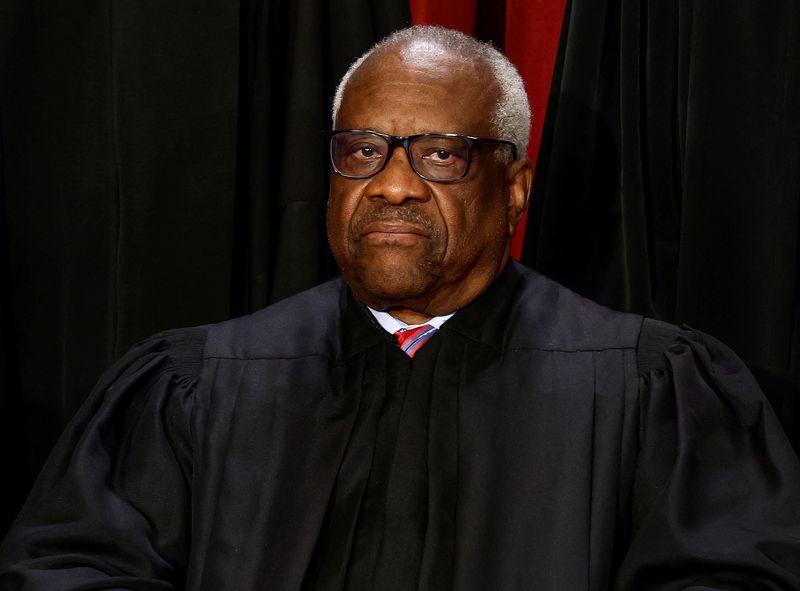By Nate Raymond
(Reuters) - Conservative Justice Clarence Thomas called on the U.S. Supreme Court on Thursday to reconsider a precedent established in 1977 that has allowed advocacy groups, trade associations and other organizations to routinely bring court challenges to government policies on behalf of their members.
Thomas laid out his position in an opinion that concurred with the Supreme Court's 9-0 ruling rejecting efforts to restrict access the abortion pill mifepristone, used in more than 60% of U.S. abortions.
The court held that four anti-abortion medical associations and several individual doctors lacked the necessary legal standing to pursue their case challenging the U.S. Food and Drug Administration's approval of pill and subsequent actions facilitating access to it.
The legal fight over the drug may not be over, though, as a federal judge in Texas, where the case was originally filed, has since allowed three Republican-led states that ban abortion to join the case as plaintiffs.
Thomas, a member of the court's 6-3 conservative majority, agreed with Thursday's ruling, saying it correctly found the Alliance for Hippocratic Medicine and other plaintiffs had not established that the FDA's actions had harmed them, which is necessary to be able to bring a case in court.
But Thomas wrote separately to highlight what he said were "constitutional concerns" and "serious problems" posed by a legal doctrine in which an association can sue on behalf of its members and claim standing on those grounds.
Thomas said Texas-based Alliance for Hippocratic Medicine's attempt to use that doctrine to claim standing illustrated the problem with it. The group is an association of other groups of doctors and sought to claim standing based on alleged harms to those physicians.
"In an appropriate case, we should explain just how the Constitution permits associational standing," Thomas wrote.
Thomas essentially attacked a long-recognized legal doctrine relied upon by associations ranging from the nation's biggest business lobby - the U.S. Chamber of Commerce - to environmental groups and gun rights advocacy organizations to challenge government policies by suing on behalf of their members.
Just last year, a group called Students for Fair Admissions that sued on behalf of its members convinced the Supreme Court to curtail the consideration of race in college admissions.
Thomas said the Supreme Court so far as he could tell had not even contemplated such a doctrine until the late 1950s, citing a civil rights-era case involving the NAACP civil rights advocacy group.
The Supreme Court later recognized the ability of membership associations to do so in a 1977 ruling in a case called Hunt v. Washington State Apple (NASDAQ:AAPL) Advertising Commission, so long as their members would otherwise have standing to sue in their own right.

But Thomas said that doctrine "seems to run roughshod" over the traditional requirement under Article III of the U.S. Constitution - the constitutional provision laying out the authority of the U.S. government's judicial branch - that plaintiffs must show a violation of their own rights to have a claim considered in court.
"If a single member of an association has suffered an injury, our doctrine permits that association to seek relief for its entire membership - even if the association has tens of millions of other, non-injured members," Thomas wrote.